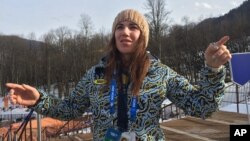SOCHI, RUSSIA —
Two members of Ukraine's Olympics team decided on Thursday to pull out of the Sochi Winter Games in support of demonstrators back home after widespread anti-government protests left dozens dead and hundreds injured.
Alpine skier Bogdana Matsotska and her coach and father Oleg Matsotskyy said they had withdrawn from Russia's first Winter Games in protest at Ukraine President Viktor Yanukovych and his government.
“I have decided not to take part in the slalom, my favorite discipline [on Friday], because of the horrible events that are happening in the capital of my Ukraine, in the Maidan [square],” the 24-year-old Matsotska told Reuters Television.
“My friends are there at the Maidan, people I know, close friends of mine. To go on the start line when people are dying and when the authorities broke the main rule of the Olympic competition, which is peace - I simply cannot do it.”
The fighting in Ukraine has left at least 50 people dead and hundreds more injured in anti-government protests and clashes with security forces.
Ukraine team officials and some athletes held a minute's silence in memory of the victims. Black ribbons were added to Ukraine flags hanging on the balconies of their building in the athletes' village.
“I am not a political person, I am totally out of politics and political parties, but I stand against these horrible actions that Yanukovich and his government are taking against our Ukrainian people,” Matsotska said. “I don't want to enter the competition under such terrible circumstances.”
Matsotska competed in the super-G and the giant slalom events, finishing 27th and 43th respectively.
Black ribbons
International Olympic Committee spokesman Mark Adams said the withdrawals were a matter for the Ukrainian team.
“I believe some of them have decided to return home and [Ukraine Olympic Committee president] Sergey Bubka has said he absolutely respects every individual's right to make their own decision,” said IOC spokesman Mark Adams.
“I think his [Bubka's] view was that the team should stay but equally he respects every athlete's decision to do what they think is best in the circumstances.
“I know that the National Olympic Committee themselves think that the best way to show some solidarity, and show in a small way what sport can do to help in reconciliation, is for the team to remain here.”
He said it was not the IOC who stopped athletes from wearing black armbands on Wednesday, as they had requested, but that it had been a decision by Ukrainian officials after they met IOC officials.
“They weren't forbidden to wear armbands,” Adams said. “The Ukrainian NOC met with IOC officials informally yesterday. They discussed what should be done, and they reached the conclusion there were other ways of marking this moment.
“Some athletes have taken other views and other ways of doing things,” Adams said.
The country, which has won one bronze medal so far, sent 43 athletes to Sochi.
Alpine skier Bogdana Matsotska and her coach and father Oleg Matsotskyy said they had withdrawn from Russia's first Winter Games in protest at Ukraine President Viktor Yanukovych and his government.
“I have decided not to take part in the slalom, my favorite discipline [on Friday], because of the horrible events that are happening in the capital of my Ukraine, in the Maidan [square],” the 24-year-old Matsotska told Reuters Television.
“My friends are there at the Maidan, people I know, close friends of mine. To go on the start line when people are dying and when the authorities broke the main rule of the Olympic competition, which is peace - I simply cannot do it.”
The fighting in Ukraine has left at least 50 people dead and hundreds more injured in anti-government protests and clashes with security forces.
Ukraine team officials and some athletes held a minute's silence in memory of the victims. Black ribbons were added to Ukraine flags hanging on the balconies of their building in the athletes' village.
“I am not a political person, I am totally out of politics and political parties, but I stand against these horrible actions that Yanukovich and his government are taking against our Ukrainian people,” Matsotska said. “I don't want to enter the competition under such terrible circumstances.”
Matsotska competed in the super-G and the giant slalom events, finishing 27th and 43th respectively.
Black ribbons
International Olympic Committee spokesman Mark Adams said the withdrawals were a matter for the Ukrainian team.
“I believe some of them have decided to return home and [Ukraine Olympic Committee president] Sergey Bubka has said he absolutely respects every individual's right to make their own decision,” said IOC spokesman Mark Adams.
“I think his [Bubka's] view was that the team should stay but equally he respects every athlete's decision to do what they think is best in the circumstances.
“I know that the National Olympic Committee themselves think that the best way to show some solidarity, and show in a small way what sport can do to help in reconciliation, is for the team to remain here.”
He said it was not the IOC who stopped athletes from wearing black armbands on Wednesday, as they had requested, but that it had been a decision by Ukrainian officials after they met IOC officials.
“They weren't forbidden to wear armbands,” Adams said. “The Ukrainian NOC met with IOC officials informally yesterday. They discussed what should be done, and they reached the conclusion there were other ways of marking this moment.
“Some athletes have taken other views and other ways of doing things,” Adams said.
The country, which has won one bronze medal so far, sent 43 athletes to Sochi.





